Comparative Adjectives look at two things. Superlative Adjectives words look at more than two things
Usually, Adjectives words that contain just a single syllable or end in "y" utilize "er" to shape comparatives and "est" to frame superlatives. For Adjectives words finishing in y, change the "y" to "i" before including the "er" or 'est'.
- old – older – oldest
- young – younger – youngest
- pretty – prettier – prettiest
- long – longer – longest
- short – shorter – shortest
- bright – brighter – brightest
- close – closer – closest
- happy – happier - happiest
Adjectives words with at least two syllables don't change however rather add more to frame comparatives and most to shape superlatives.
- respectable – more respectable – most respectable
- beautiful – more beautiful – most beautiful
- preferable – more preferable – most preferable
- hardworking – more hardworking – most hardworking
A few Adjectives words have distinctive types of comparatives and superlatives.
- good – better – best
- bad – worse – worst
- little – less – least
- much (many) – more – most
- far – further - furthest
- John is smarter than Betty.
- Sid is stronger than Dan.
- Mark is more diligent than his brother.
- I have more apples than he.
- She likes him more than me.
Superlatives are normally joined by the word the.
- Cruz is the oldest man in town.
- George is the tallest boy in the neighborhood.
- That shade of yellow is the most beautiful color.
- This is the longest song that I have ever heard.

















